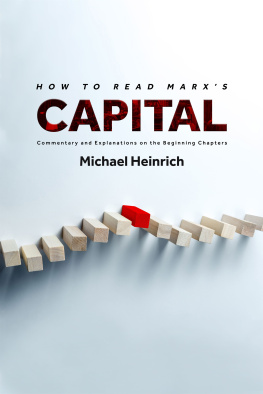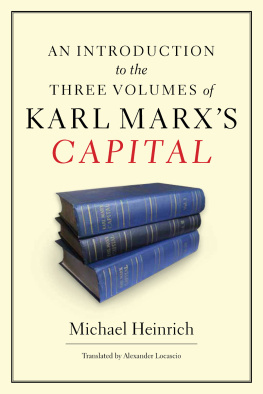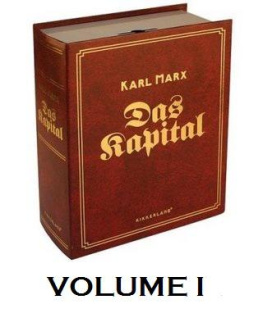KARL MARX AND THE BIRTH
OF MODERN SOCIETY
Karl Marx and the Birth
of Modern Society
The Life of Marx and the Development of His Work
VOLUME I: 18181841
by MICHAEL HEINRICH
translated from the German by Alexander Locascio

Copyright 2019 by Michael Heinrich
All Rights Reserved
Originally published as Karl Marx und die Geburt der modernen Gesellschaft by Schmetterling Verlag GmbH, Stuttgart, Germany 2018 by Schmetterling Verlag GmbH.
English translation by Alexander Locascio published by Monthly Review Press 2019
by Monthly Review Press
Library of Congress Cataloging-in-Publication Data
Names: Heinrich, Michael, 1957- author.
Title: Karl Marx and the birth of modern society : the life of Marx and the development of his work / by Michael Heinrich ; translated from the German by Alexander Locasio.
Other titles: Karl Marx und die Geburt der modernen Gesellschaft. English
Description: New York : Monthly Review Press, [2019]| Includes bibliographical references and index.
Identifiers: LCCN 2019017089 (print) | LCCN 2019018221 (ebook) | ISBN 9781583677360 (trade) | ISBN 9781583677377 (institutional) | ISBN 9781583677353 (hardcover)
Subjects: LCSH: Marx, Karl, 1818-1883. | CommunistsGermanyBiography. | CommunismHistory. | Marxian economicsHistory.
Classification: LCC HX39.5 (ebook) | LCC HX39.5 .H4413 2019 (print) | DDC 335.4092 [B] dc23
LC record available at https://lccn.loc.gov/2019017089
ISBN cloth 978-1-58367-735-3
Monthly Review Press
134 West 29th Street, Suite 706
New York, New York 10001
www.monthlyreview.org
Typeset in Minion Pro
5 4 3 2 1
CONTENTS
For Karin (19552013), with whom so much began
PREFACE
For instance, Meyers Konversationslexikon wrote a long time ago asking me for a biography. Not only did I not send one; I did not even reply to the letter.
KARL MARX, LETTER TO LUDWIG KUGELMANN,
OCTOBER 26, 1868 (MECW 43: 144)
Karl Marx probably would not have wanted a biography, and certainly not one planned for multiple volumes. He emphasized to Wilhelm Blos in Hamburg that neither of us cares a straw for popularity. Let me cite one proof of this: such was my aversion to the personality cult that at the time of the International [meaning the International Workingmens Association, 18641876] when plagued by numerous movesoriginating from various countriesto accord me public honor, I never allowed one of these to enter the domain of publicity, nor did I ever reply to them, save with an occasional snub (letter from November 10, 1877, MECW 45: 288).
This work is not concerned with a cult of personality. Marx is neither placed on a pedestal, nor is he condemned. Nor is history, not even the history of the creation of important theories, reduced to the influence of great men. It is concerned with the historical process in which Karl Marx developed as a person, as a theorist, as a political activist, and as a revolutionary. This was a process in which Marx intervened not only through the publication of his analyses and commentaries, but also through the founding of newspapers and his efforts to reshape organizations such as the Communist League or the International Workingmens Association.
Already in the last decade of his life, a broad and increasingly international reception of his work began that has continued up to today. In the twentieth century, multiple revolutions and state formations aimed at overcoming bourgeois-capitalist relations referred to Marxs theories. A huge number of political parties and groups that exhibited large differences and in part vehemently fought one another referred to themselves in the twentieth century as Marxist. This enormous political influence was accompanied by a transformation of Marx the person by adherents as well as opponents into a positive or a negative icon. At the same time, Marxs extensive work was usually only taken up very selectively.
That which Marx published himself was only the tip of a gigantic iceberg that only saw the light of day gradually in the twentieth century. Every generation was familiar with a different set of complete works from which one could cherry-pick. Only now, at the beginning of the twenty-first century are we close to having an overview of Marxs complete works with the aid of the new, but not yet completely published, Marx-Engels-Gesamtausgabe (MEGA).
Whereas Marx emphasized again and again how time-bound all intellectual production is, his own work was frequently extricated from the conditions of its creation and regarded as a system of timeless statements. Marxs enormous learning processes, which repeatedly led to theoretical new beginnings and revisions, and above all left behind unfinished work, were often not really noticed. Marx had to always already be Marx. In contrast, in the last few decades a necessary historicization was often spoken of: the necessity of placing Marxs life and work in historical context. This was in part an act of defensethe historicized Marx was to be an object of history with nothing more to say to us today. In part, this was also an obligatory exercise in order to continue on as before. But an adequate historicizing requires not only a change of ones line of vision, to the extent that one devotes more attention to the historical background; its also a real research task in which this or that certainty is left by the wayside.
When reading many Marx biographies, one can get the impression that the statements about Marx were decided beforehand, and the biographical material merely serves to buttress already existing results. In contrast, I admit that the work on this biography over many years led to changes in my picture of the person, as well as his work and its development. And this research process is far from finished.
This first volume of this book deals with Marxs youth in Trier and his studies in Bonn and Berlin, with his doctoral dissertation as his first independent work. In some Marx biographies this is the material for one or two brief introductory chapters; things first appear to get interesting after that. I hope to disprove this judgment. The importance of Marxs school days, his attempts at poetry, his engagement with religion and the philosophy of religion, as well as his dissertation, seem to me to deserve a more exact consideration than hitherto usual, and the political processes and debates in Prussia in the 1830s have to be taken into consideration all the more. I do not at all wish to assert that this early phase is something like the key to Marxs life and work; there were enough shifts that werent predictable. Nonetheless, the experiences and learning processes of Marxs student days constitute the background against which his journalistic and political influence plays out in the following years.
Its not just the subject of a biography thats historical; the person writing the biography is, with his questions and preconditions, also a product of his time and social conditions. One cannot escape such influence, but one can attempt to deal with it consciously. In the past eight years, I not only was able to participate in conferences in various countries, in Brazil, China, and India in particular, I also had the possibility of conducting seminars and workshops on Marx and to discuss with people active in various political and social contexts. The experience that I was able to gather, the various perspectives on Marx and his work that I got to know, have helped me to better understand the historical situation of my own judgments and to question my own apparent matters of course.
Next page














